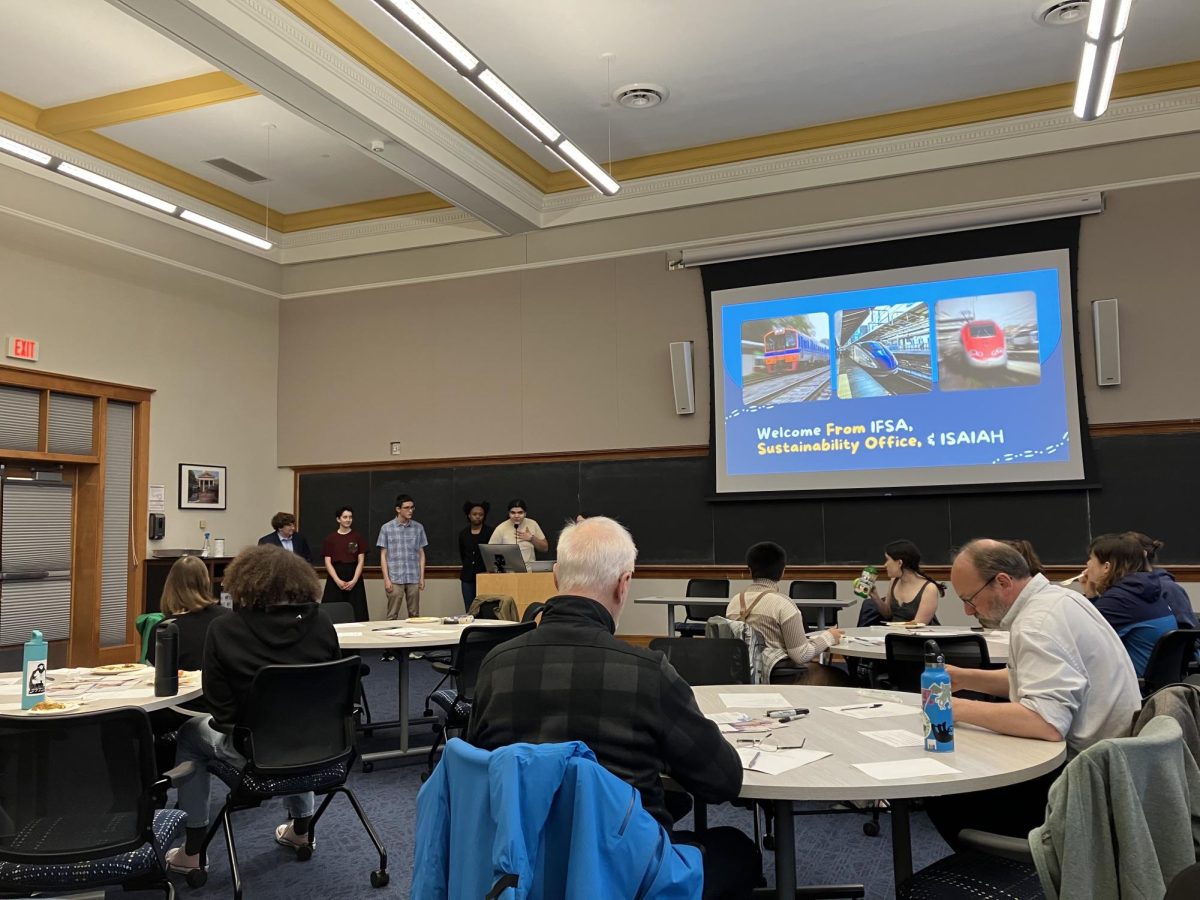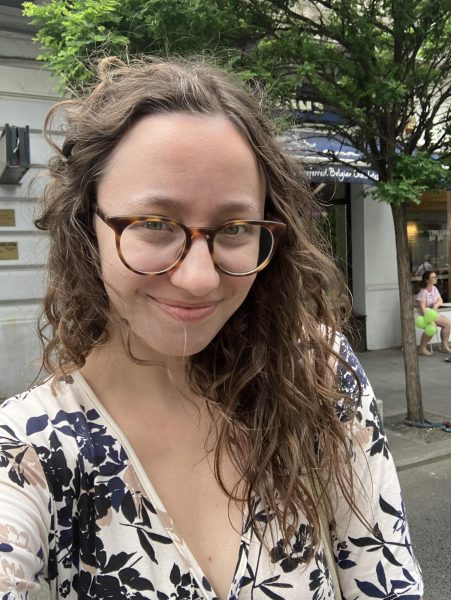In front of a slide show of mostly trains, ISAIAH and Interfaith Social Action members presented last week to a group of Carleton students, faculty and Northfield community members about Northfield’s need for increased public transportation. Northfield’s State Representative Kristi Pursell and Rochester’s State Senator Liz Boldon each spoke and responded to questions from the audience.
Various materials were scattered across tables for the events: Pursell’s legislative reports, business cards and stickers, agendas for the event and prompts to promote discussion at each table.
The presentation began with a simple request: that students should sit with community members, and that community members should sit with students. This summed up the purpose of the event: for Carleton to come together with the local community to address shared transportation needs.
The event was hosted by Interfaith Social Action (IFSA), a group run through the Office of the Chaplain, the Carleton Sustainability Office and ISAIAH (an interfaith social justice group based in St. Paul). It was the culmination of a series of events during Fall and Winter Term. During Fall Term, IFSA and ISAIAH hosted an organizing training. While looking for what to focus on, they found a gap in issues people were already working on: transportation.
During Winter Term, IFSA sent out a survey to better understand students’ transportation needs, and got nearly 600 responses. Kathryn Lozada, a Carleton alum and ISAIAH community organizer, spoke about working with legislators on issues of transit justice. Last fall, ISAIAH “did a season of deep listening” and studied how transportation matters for both people and the climate. She also discussed past Minnesota legislation that addresses transit justice, which included allocating $500 million last year for transit and passing a bill to consider the effects on the climate of transit infrastructure.
“In the fall, ISAIAH led a training,” said College Chaplain Schuyler Vogel. “So organizing one on one but also conversation around what matters to people both in IFSA and beyond. One of the things that just kept on coming up again was transportation.”
Josh Grossman ’24, a student who will be attending graduate school to study sustainable transportation and infrastructure planning, said he thought “it was really great to see the Carleton, Northfield, and greater Rice County communities come together at this meeting.”
“Coming from a city with good and very thorough public transit, moving to and interfacing with rural Minnesota’s public transit, or even private transit infrastructure, was definitely jarring,” said Grossman. “I love to bike and remember, before Tin Tea opened, biking all the way to Burnsville with one of my classmates during my freshman year to get some boba.”
“There is a trend in the United States of wealthy metropolitan suburbs resisting and lobbying against public transit infrastructure (Edina is a great example of this) and certainly many of these voices will also surface in Northfield during these conversations,” he added. “Getting the conversation started and rallying community around support for this valuable cause is never going to be bad.”
Sarah Fortner, the director of Carleton’s Sustainability Office, spoke about the importance of thinking about the larger issues of transit equity, rather than only focusing on Carleton’s internal transit issues.
President Alison Byerly also spoke, discussing the importance of working with the Northfield community on “how to make transportation affordable and achievable for students and the community.”
She also brought up issues specific to Carleton, such as that students feel strongly about climate activism and that Carleton is relatively unique in limiting which students can have cars, making sustainable transportation more important.
According to Byerly, Carleton’s new strategic plan, published in Fall 2023 and titled “Carleton 2033: The Liberal Arts in Action” highlights the need for “improved connectivity with lots of groups around [Carleton]” —addressing transit justice is one way Carleton is working on that. Transportation, Byerly said, is about more than just getting students off campus: it’s also about welcoming people to Carleton.
Member of the Minnesota State House Kristi Pursell, Carleton’s representative, briefly introduced herself and the next speaker, Minnesota State Senator Liz Boldon. She started by emphasizing her connections to Northfield. She told attendees: “Don’t be mad, but I’m a St. Olaf grad,” before explaining that she grew up in Rochester and now lives in Northfield, so she’s lived in Southern Minnesota for nearly her whole life.
“This is what democracy looks like,” Pursell explained, referencing the number of people that cared enough about transportation justice to attend the event. While Pursell isn’t on the Transportation Committee, she serves on committees relating to the environment, elections and education, and is the vice chair of the agricultural committee —all committees she said connect to transportation.
“When there’s only one option, there’s not a lot of impetus for coming up with new options,” Pursell said. Northfield is “supposed to be one of the greatest communities to retire to… “[and] when seniors and people with disabilities have access to transportation, that improves everyone’s lives.”
She also emphasized that her main goal was to listen to what people needed on the subject of transportation. “Let this be an invitation to follow up and engage,” Pursell concluded towards the end of the talk.
Pursell also introduced Minnesota State Senator Liz Boldon, who serves on, among others, the Transportation Committee, among others, and is the assistant majority leader of the State Senate. Boldon represents Rochester, rather than Northfield, but was described by Pursell as an “honorary Northfieldian.”
Advertisements for the event listed Minnesota State Representative Samantha Sencer-Mura, rather than Boldon, as one of the elected officials. No reason was announced for the change in attendees.
Boldon is new to the Transportation Committee, and spoke about how she ended up in the Minnesota State Legislature. She’s a nurse, and didn’t originally plan to run for office : “[But, I] have to be able to look [my kids] in the eyes and tell them I’ve done everything I can to make the world a better place,” she said.
She spoke about her experiences dealing with transportation for her son, who uses a wheelchair, and the difficulty of finding transportation when her wheelchair-accessible van wasn’t working.
“The lawmakers seemed to understand that this is a very big issue for our community, so I’m hoping they can make it a priority in order to support the needs of their constituents,” IFSA member Isaac Kofsky ’27 (a Carletonian Viewpoint Editor) told the Carletonian later.
Following those speeches, IFSA members spoke about the survey they conducted and their own experiences surrounding transportation. 574 students filled out the survey, and they found that pricing and the unavailability of Northfield Lines is “really out of control,” said Jai Miles ’27.
The survey found that 87.3% of students don’t have a car or regular access to a friends’ personal vehicle, and that students mostly only use Northfield Lines to go to the airport.
Miles spoke first, talking about how her county lowered the cost of public transportation to meet the community’s needs. “Carleton used to subsidize part of trips on Northfield Lines…We’d really appreciate not having to pay almost $40 to go to the mall or airport,” she explained.
She discussed how students reported buses filling up, which “leaves students scrambling for options” and causes stress. She also highlighted how this affects Northfield residents, bringing up that “the same buses that carry Carleton and St. Olaf students…are also carrying Northfield residents.”
Kofsky spoke next, talking about how public transportation in New Jersey has helped him and his family. He said the transportation system helped him “become more independent and aware of my surroundings.”
“While I love Carleton’s campus and downtown Northfield, it can be frustrating to not have good access to the Twin Cities,” said Kofsky. “When touring and interviewing at Carleton, I was told that students were able to go into the Twin Cities frequently thanks to the Northfield Lines bus system. But with tickets being $35 dollars each way and buses only running twice a day except for at the beginning and end of term, I haven’t gone into the Cities once, and I have only used the bus to go to the airport.”
Heidi Maghan, the executive director of Epic Enterprise, spoke next. Epic Enterprise is a non-profit organization based in Duluth that helps people with disabilities find jobs and community.
“Lack of transportation is a significant barrier for people with disabilities,” she explained. “Accessible transportation is not just a matter of convenience, it’s a human rights issue.”
Maghan highlighted how transportation is essential for people with disabilities looking for work. Lack of transportation can limit their independence —people who rely on Epic Enterprise for transportation to and from work often have to work between 8 a.m. and 5 p.m. regardless of what works best for them because they need to work at times when Epic Enterprise staff members are available to help them get to and from work.
Pursell and Boldon both commented on the stories. “Your experience is not yours alone, there are a lot of people nodding,” said Pursell.
“Pretty clearly it’s not meeting [the community’s] needs now,” said Goldon. “If [transportation] isn’t convenient for people, they’re not going to use it…if it’s more costly than people can afford, they’re not going to use it.”
“I was really pleased that we were able to see that passion shared by so many at our event on Sunday,” said Sophie Stein ’26, one of the IFSA leaders. “Being able to fill a room and run out of Desi Diner, which we almost never run out of at Chapel events because their serving sizes are so generous, was really powerful.”
“We’ll be connecting with CSA and St. Olaf in the coming weeks, and hopefully showing administration by the end of the term that this is an issue students are really thinking about right now, and it’s something people are really wanting to see change,” said Stein. “My biggest hope is that we’ll see the same energy we saw on Sunday night continue, because it’s that people power that has the chance to really initiate some change at Carleton.”
“I was delighted to see so many different people from so many different places,” said Vogel. “Strong student turnout, strong community turnout [and] elected officials (both ones that we had invited and ones who just came)…I think that’s a real sign that people are hearing about it through word of mouth…I was pleased that our students were able to put together such a robust panel.”











